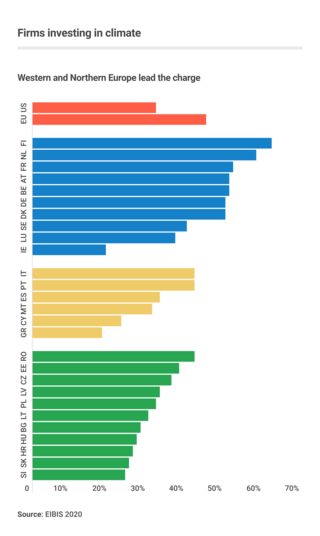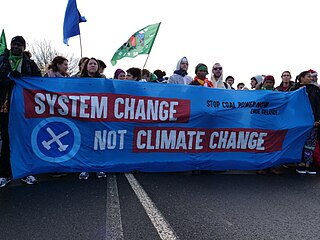Related Research Articles

Renewable energy is energy from renewable natural resources that are replenished on a human timescale. The most widely used renewable energy types are solar energy, wind power, and hydropower. Bioenergy and geothermal power are also significant in some countries. Some also consider nuclear power a renewable power source, although this is controversial. Renewable energy installations can be large or small and are suited for both urban and rural areas. Renewable energy is often deployed together with further electrification. This has several benefits: electricity can move heat and vehicles efficiently and is clean at the point of consumption. Variable renewable energy sources are those that have a fluctuating nature, such as wind power and solar power. In contrast, controllable renewable energy sources include dammed hydroelectricity, bioenergy, or geothermal power.

A fossil fuel is a carbon compound- or hydrocarbon-containing material formed naturally in the Earth's crust from the buried remains of prehistoric organisms, a process that occurs within geological formations. Reservoirs of such compound mixtures, such as coal, petroleum and natural gas, can be extracted and burnt as a fuel for human consumption to provide energy for direct use, to power heat engines that can propel vehicles, or to generate electricity via steam turbine generators. Some fossil fuels are further refined into derivatives such as kerosene, gasoline and diesel, or converted into petrochemicals such as polyolefins (plastics), aromatics and synthetic resins.

The politics of climate change results from different perspectives on how to respond to climate change. Global warming is driven largely by the emissions of greenhouse gases due to human economic activity, especially the burning of fossil fuels, certain industries like cement and steel production, and land use for agriculture and forestry. Since the Industrial Revolution, fossil fuels have provided the main source of energy for economic and technological development. The centrality of fossil fuels and other carbon-intensive industries has resulted in much resistance to climate friendly policy, despite widespread scientific consensus that such policy is necessary.

Business action on climate change is a topic which since 2000 includes a range of activities relating to climate change, and to influencing political decisions on climate change-related regulation, such as the Kyoto Protocol. Major multinationals have played and to some extent continue to play a significant role in the politics of climate change, especially in the United States, through lobbying of government and funding of climate change deniers. Business also plays a key role in the mitigation of climate change, through decisions to invest in researching and implementing new energy technologies and energy efficiency measures.

The fossil fuels lobby includes paid representatives of corporations involved in the fossil fuel industry, as well as related industries like chemicals, plastics, aviation and other transportation. Because of their wealth and the importance of energy, transport and chemical industries to local, national and international economies, these lobbies have the capacity and money to attempt to have outsized influence on governmental policy. In particular, the lobbies have been known to obstruct policy related to environmental protection, environmental health and climate action.

Fossil fuel phase-out is the gradual reduction of the use and production of fossil fuels to zero, to reduce deaths and illness from air pollution, limit climate change, and strengthen energy independence. It is part of the ongoing renewable energy transition, but is being hindered by fossil fuel subsidies.

Individual action on climate change describes the personal choices that everyone can make to reduce the greenhouse gas emissions of their lifestyles and catalyze climate action. These actions can focus directly on how choices create emissions, such as reducing consumption of meat or flying, or can be more focus on inviting political action on climate or creating greater awareness how society can become more green.

Climate change has resulted in an increase in temperature of 2.3 °C (4.14 °F) (2022) in Europe compared to pre-industrial levels. Europe is the fastest warming continent in the world. Europe's climate is getting warmer due to anthropogenic activity. According to international climate experts, global temperature rise should not exceed 2 °C to prevent the most dangerous consequences of climate change; without reduction in greenhouse gas emissions, this could happen before 2050. Climate change has implications for all regions of Europe, with the extent and nature of impacts varying across the continent.

An energy transition is a major structural change to energy supply and consumption in an energy system. Currently, a transition to sustainable energy is underway to limit climate change. Most of the sustainable energy is renewable energy. Therefore, another term for energy transition is renewable energy transition. The current transition aims to reduce greenhouse gas emissions from energy quickly and sustainably, mostly by phasing-down fossil fuels and changing as many processes as possible to operate on low carbon electricity. A previous energy transition perhaps took place during the Industrial Revolution from 1760 onwards, from wood and other biomass to coal, followed by oil and later natural gas.

The climate movement is a global social movement focused on pressuring governments and industry to take action addressing the causes and impacts of climate change. Environmental non-profit organizations have engaged in significant climate activism since the late 1980s and early 1990s, as they sought to influence the United Nations Framework Convention on Climate Change (UNFCCC). Climate activism has become increasingly prominent over time, gaining significant momentum during the 2009 Copenhagen Summit and particularly following the signing of the Paris Agreement in 2016.

Climate change litigation, also known as climate litigation, is an emerging body of environmental law using legal practice to set case law precedent to further climate change mitigation efforts from public institutions, such as governments and companies. Finding that climate change politics provides insufficient climate change mitigation for their tastes, activists and lawyers have increased efforts to use national and international judiciary systems to advance the effort. Climate litigation typically engages in one of five types of legal claims: Constitutional law, administrative law, private law, fraud or consumer protection, or human rights.
Our Children's Trust is an American nonprofit public interest law firm based in Oregon that has filed several lawsuits on behalf of youth plaintiffs against state and federal governments, arguing that they are infringing on the youths' rights to a safe climate system.

The 2021 United Nations Climate Change Conference, more commonly referred to as COP26, was the 26th United Nations Climate Change conference, held at the SEC Centre in Glasgow, Scotland, United Kingdom, from 31 October to 13 November 2021. The president of the conference was UK cabinet minister Alok Sharma. Delayed for a year due to the COVID-19 pandemic, it was the 26th Conference of the Parties (COP) to the United Nations Framework Convention on Climate Change (UNFCCC), the third meeting of the parties to the 2015 Paris Agreement, and the 16th meeting of the parties to the Kyoto Protocol (CMP16).
Jamie Margolin is a Colombian-American climate justice activist. She is a co-founder of Zero Hour, a climate-focused youth organization that is part of Future Coalition.

Licypriya Kangujam is a child environmental activist from India. One of the youngest climate activists globally, she addressed world leaders at the 2019 United Nations Climate Change Conference in Madrid, Spain, asking them to take immediate climate action. Licypriya has been campaigning for climate action in India since 2018, to pass new laws to curb India's high pollution levels, and to make climate-change literacy mandatory in schools. She has been regarded as India's Greta Thunberg, though she does not like the usage of this term.

Sophia Kianni is an Iranian-American social entrepreneur and climate activist. She is the founder and president of Climate Cardinals, a nonprofit offering climate change information in multiple languages, serves on the EPA's National Youth Advisory Council, and as an advisor to the United Nations. She is the youngest United Nations advisor in US history.
Mikaela Loach is a British climate justice activist, author, and former medical student.
The Fossil Fuel Non-Proliferation Treaty Initiative is a diplomatic and civil society campaign to create a treaty to stop fossil fuel exploration and expansion and phase-out existing production in line with the targets of the Paris Climate Agreement, while supporting a just transition to renewable energy.

Yusuf Baluch is an indigenous Climate justice and Human Rights activist. He started activism after experiencing the first hand impacts of the climate crisis in his community. He is an organizer with School Strike for Climate where he organizes with the regional chapter of Fridays For Future Balochistan.
This article documents events, research findings, scientific and technological advances, and human actions to measure, predict, mitigate, and adapt to the effects of global warming and climate change—during the year 2023.
References
- ↑ "Who We Are". Zero Hour. 5 December 2022. Archived from the original on 16 April 2021. Retrieved 20 April 2021.
- 1 2 Marguerite, Christianne (23 January 2019). "Young Environmentalist Is Inspired By Growing Up On Long Island Sound". The Nature Conservancy. Retrieved 20 April 2021.
- ↑ Yoon-Hendricks, Alexandra (21 July 2018). "Meet the Teenagers Leading a Climate Change Movement". The New York Times. Retrieved 20 April 2021.
- ↑ Janfaza, Rachel (3 January 2020). "9 Climate Activists of Color You Should Know". Teen Vogue. Retrieved 20 April 2021.
- ↑ Amyx, Scott (10 June 2019). "Interview with Zanagee Artis, 19 Year Old Co-Founder of Zero Hour". Scott Amyx. Retrieved 20 April 2021.
- ↑ Kormann, Carolyn (July 22, 2018). "The Teen-Agers Fighting for Climate Justice". The New Yorker. Retrieved 20 April 2021.
- 1 2 Napoli, James (25 September 2020). "'Climate Change Is a Barrier to Our Future'". Rewire. Retrieved 20 April 2021.
- ↑ "Zanagee Artis". Swearer Center. Brown University. Retrieved 20 April 2021.
- ↑ Aratani, Lauren (3 August 2020). "With big rallies cancelled, young climate activists are adapting election tactics". The Guardian. Retrieved 20 April 2021.
- ↑ hello@verdicalgroup.com (2023-09-29). "Honoring Past Keynote Speakers and Trailblazer Award Winners". Net Zero Conference. Retrieved 2024-09-06.
- ↑ Greenspan, Zanagee Artis and Olivia (2021-05-17). Soto, Denise Morales (ed.). A Kids Book About Climate Change. A Kids Company About, Inc. ISBN 978-1-951253-75-2.
- ↑ "Student Spotlight: Zanagee Artis '22 | Climate Solutions Lab". watson.brown.edu. Retrieved 2024-02-12.
- ↑ "Zanagee Artis, Fossil Fuels Policy Advocate, Nature". www.nrdc.org. 2023-12-22. Retrieved 2024-02-12.
- ↑ Gelles, David (2023-08-19). "With TikTok and Lawsuits, Gen Z Takes on Climate Change". The New York Times. ISSN 0362-4331 . Retrieved 2024-02-12.
- ↑ "Zanagee Artis, Fossil Fuels Policy Advocate, Nature". www.nrdc.org. 2023-12-22. Retrieved 2024-02-12.
- ↑ "Zanagee Artis, Fossil Fuels Policy Advocate, Nature". www.nrdc.org. 2023-12-22. Retrieved 2024-02-12.
- ↑ "Zanagee Artis | Swearer Center. Brown University". www.brown.edu. Retrieved 2024-02-12.